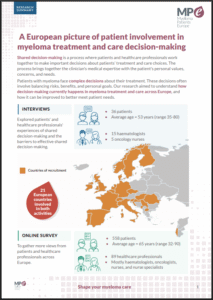September 2, 2025
Shape your myeloma care: New MPE research highlights the power of shared decision-making in myeloma care
Shape your myeloma care: New MPE research highlights the power of shared decision-making in myeloma care
Myeloma is a form of blood cancer. At diagnosis, and at each relapse, myeloma patients are confronted with complex treatment and care decisions that may feel overwhelming. What are my options? What are the side effects? How will it affect my quality of life? The questions you have regarding your care choices are deeply personal and important for healthcare professionals to know when discussing your care. Including what is important to you can help to shape your treatments and care to better fit your needs and preferences.
Given how important this topic is, we’re excited to share our new research that sheds light on how decision-making currently takes place in myeloma treatment and care across Europe and recommends how to improve things for patients.
What is shared decision-making?
Shared decision-making is exactly what it sounds like: a process where you and your healthcare team work together to make important decisions about your treatment and care. It combines your health professionals’ medical expertise with your values, concerns, lifestyle, and personal goals.
Think of it as a partnership where your voice helps to shape the path forward for your treatment and care. You can be involved in your treatment and care decisions, as much or as little as you want!
What our research showed
More than half (57%) of myeloma patients had never heard of shared decision-making. Even when patients had heard of shared decision-making, many reported that it did not happen consistently in practice:
- patients weren’t always asked if they understood their treatment options or asked how they preferred to receive information
- many didn’t get the opportunity to share their fears, concerns, or preferences
- discussion of treatment alternatives was often limited
Our research also found that time constraints in hospital appointments, emotional overwhelm for patients and communication challenges were amongst the biggest barriers to shared decision-making in practice.
Find out more about our research, and our recommendations for improvements in treatment and care decision-making, in our research summary below.
